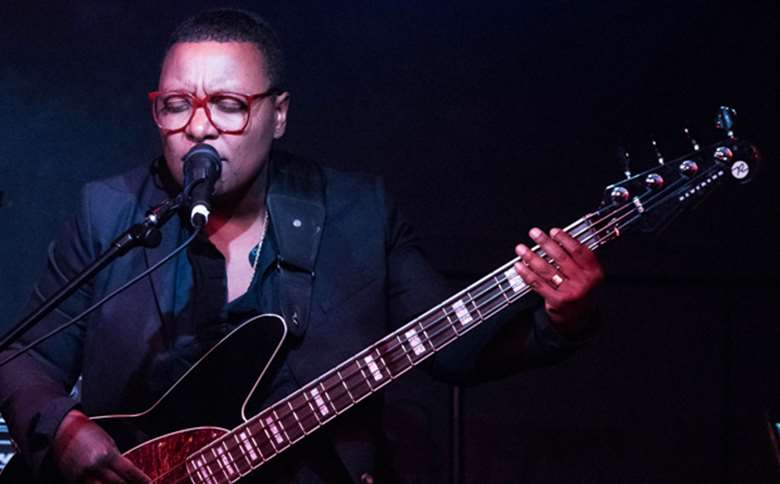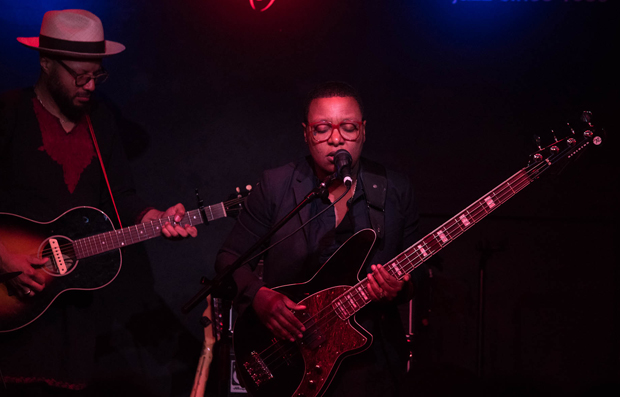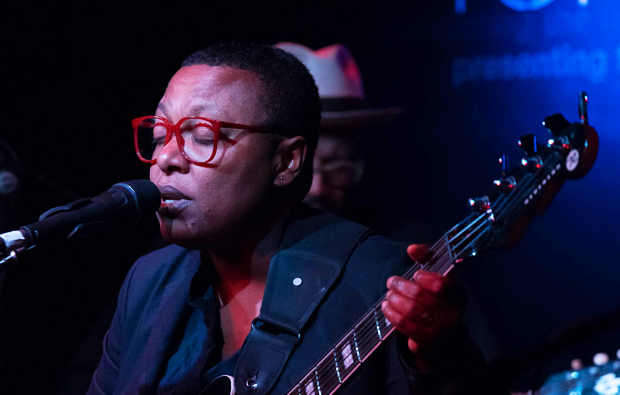Meshell Ndegeocello grooves to the spirit of Nina Simone at Ronnie Scott’s
Thursday, May 14, 2015
The sight of Patrick Stewart, Adrian Lester and Tony Robinson, discreet but nonetheless radiating charisma amid muted gasps of recognition, brings a BAFTA-esque frisson to the air.

That she attracts stars of stage and screen may not cut any ice with Meshell Ndegeocello, an artist who has eschewed the fame game script for over 20 years, opting instead for a narrative of the most resolute creative independence, if not risk.
That she was initially signed to Madonna’s label is neither here nor there. That she is willing to hail the presence in the audience of Nathan East, one of the greatest of session bassists – Stevie, Herbie and latterly Clapton – is an act of generosity that makes the point that musicianship, especially from those who are not in the spotlight, is what really lies at the heart of Ndegeocello’s raison d’etre. Perhaps, symbolically Jebin Bruni’s drum kit is at the front rather than the back of the stage and guitarist Chris Bruce and keyboardist Abe Rounds are packed in very close to Ndegeocello and her bass guitar. The tableau evokes the proverbial tightly knit crew, where the input of no member outweighs that of another. This is not just an ideal. As they prove over an hour and a half of songs of a hypnotic reverie that is upholstered by a tightly controlled force the whole is greater than the sum of the parts. The virtuosity is collective rather than individual.

More to the point, understatement and dynamics are of paramount importance. Based largely on Ndegocello’s two most recent albums, 2013’s Pour Une Ame Souveraine (A Dedication To Nina Simone) and last year’s Comet, Come To Me, the set is all about breathing space in the arrangements as well as the careful choice of the moment for a stark, potent exhalation. The most striking and effective example of this is the way Ndgeocello strips her bass line down to a root note to allow the dancing percussive surge of the drums to punch its way to prominence, bringing out for example the gorgeous West Indian lilt of ‘Suzanne’. The piece is cast as the subtlest of modern calypsos.
Then again the entwining of Bruce’s guitar and Rounds’ keys on other Simone anthems, notably ‘Don't Let Me Be Misunderstood’ and ‘See Line Woman’, lays bare a kind of mutant dub-rock in which serrated, spooky sounds crackle sensually around Ndegeocello’s deep purr of a lead vocal. As the set unfolds, Rounds produces a number of increasingly eerie vibrations from his workstation of synths and laptop, the most haunting of which tips the music into a reggae-ish lament for the digital age. Jamaica, above all in the wily nods to the low-end artistry of the Barretts and Shakespeares, pervades the gig to great effect.
Having said that some of Ndegeoellos’ more elaborately constructed lines, circling hypnotically on pentatonics, inject all of the funk of past glories such as 1993’s Plantation Lullabies and 2002’s Cookie (The Anthropological Mixtape) without disrupting the poise of the ensemble. Consistently, the spirit of Simone drifts sharply into view. With unabashed sexual as well as emotional and political intent, she was known to ask in her songs: ‘Do I groove you?’, reminding us that to really ‘rock’ another human being is to touch heart, mind and body.

Ndegeocello’s groove is working on a similar plurality, meaning that essentially the lyric, the shameless truth of a thought – ‘Forget My Name’; ‘Good Day Bad’– gels with the cut of the voice and the thrust of the music. Since her debut Ndgeocello has been fearless in her desire to broach human nature in its most contentious manifestations, and although commentators have been quick to highlight her references to homosexuality and the hypocrisy and paranoia it engenders, the more important point is that she has dissected the dehumanisation that stalks all of us, especially in an increasingly image-conscious world.
Hence the piece that closes the evening, ‘Friends’, could not be more appropriate. As Ndegeocello raps the brilliantly observant verses many in the audience may not be aware that this is one of hip-hop’s great anthems, a meditation on the vagaries of trust by electro pioneers Whodini, recorded back in the early 1980s, a time when the magic’s wand of the music was often wielded to pay tribute to others rather than to demand to be paid by all and sundry. Yet it is precisely friends rather than stars that are the life and soul of this sorceress performance.
Which means that Laura Mvula can nod her head at the bar in peace.
– Kevin Le Gendre
– Photos by Benjamin Amure